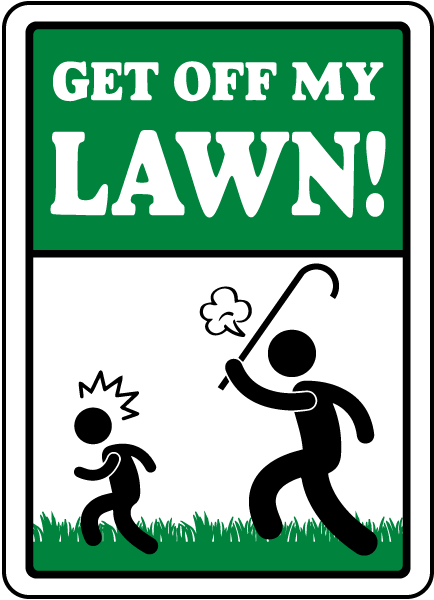5. Get off my lawn! (October 2019)
 Monday, October 14, 2019 at 7:01PM Comments Off
Monday, October 14, 2019 at 7:01PM Comments Off In my first year on the tenure track, Green Day’s Wake Me Up When September Ends was on the radio all the time. I’d drive to school singing along to, "Like my fathers come to pass, seven years have gone so fast," thinking that in seven years I’d be tenured, and if I was lucky, the time would indeed go fast. When that section of the song repeats, the lyric is “twenty years have gone so fast.” By then I figured I would be fully promoted and Arrived, both as a teacher and composer – something too distant even to imagine.
As a graduate student and young professional, “arrived” meant something different to me than what it means today. Back then, I thought I’d have a huge catalog of published works. I’d have won the two or three big contests for band composition. Then I’d be invited to join panel talks with famous composers at prestigious conferences, who would know my name without checking my nametag. The conductor-royalty of the day would commission and program my music, too, and I would no longer constantly feel like I had something to prove.
Sure, I remember being advised as a youngster that it takes a long time for a composer’s mature voice to emerge and even longer to develop a network of supportive conductors and performers. Be careful of what you wish for, my mentors admonished, especially regarding contests and publishers. Contests are political  and subjective more than artistic, great if you win but otherwise not worth the effort. Publishers make money, not art, so it’d be a shame to end up locked into an expectation of writing a certain kind of (superficial) music, or becoming driven by the next piece selling better than the last one, before I’d even had a chance to find my voice.
and subjective more than artistic, great if you win but otherwise not worth the effort. Publishers make money, not art, so it’d be a shame to end up locked into an expectation of writing a certain kind of (superficial) music, or becoming driven by the next piece selling better than the last one, before I’d even had a chance to find my voice.
That’s all true; I certainly tell my students the same things.
Eventually, I got so tired of nervously checking, “Is this it? Have I ‘made it’?” that I guess I gave up, got busy with other concerns, and stopped thinking about it at all.
Something changed when I visited another university recently as a guest artist. The other composers with me were all 12-14 years younger. We had similar academic credentials but they existed in a reality quite different from my own, where tenure track jobs are few and impossible to get and a freelance, financially uncertain livelihood is now the norm. At their age, this would’ve given me nightmares. It was more than that, though. Something kept nagging at me as we talked among ourselves and engaged students and the community. I felt more at ease with the middle-aged administrator who drove us to events. True, outsider is my default relationship with the world, but usually I can count on fitting in with fellow composers!
I spent the weekend trying to verbalize this chafing and discomfort to myself.
 That was when the light bulb came on: oh yeah, “at their age.” In October when I was 32, that Green Day tune was new on the radio. I had not yet visited David Maslanka or met Chris Werner – seismic events in my evolution as a composer! At 32, I’d had a few commissions and performances, and had long since been published, but that was still more than a year before Mark Camphouse offered me a chapter in Composers on Composing for Band – in the young composer volume.
That was when the light bulb came on: oh yeah, “at their age.” In October when I was 32, that Green Day tune was new on the radio. I had not yet visited David Maslanka or met Chris Werner – seismic events in my evolution as a composer! At 32, I’d had a few commissions and performances, and had long since been published, but that was still more than a year before Mark Camphouse offered me a chapter in Composers on Composing for Band – in the young composer volume.
A lot happened over 14 years. I'm 46 now, but I was 34 when Chris commissioned my Symphony no. 3. By 37, bullying and sabotage within my own department taught me that dedication to a university job rarely goes unpunished. By 40, successfully tenured, I feared the toll those conflicts took on me had deflated and derailed my composing career. A state budget crisis pushed me into union organizing at 42, where my musician's comfort with a microphone and stage, but also my composer's comfort with strategizing, writing, and lecturing, turned out to be a powerful combination. I was 43 and riding high when the bands at Nebraska-Lincoln commissioned me for a work to premiere at a CBDNA conference, enjoying the security of finally being fully promoted and “safe” from attack in my teaching position … but so shortly after that, both Chris and David passed away.
That’s in addition to the everyday challenges of regular life, of learning to distinguish benevolent from malevolent influences, of accepting joys and sorrows. All of that is assimilated into a composer’s music, one way or another. Finally, the union ratified its first contract in August 2018, I succumbed to exhaustion and bronchitis in September, and then, there I was in October, wondering why I felt so different from the young composers sitting next to me, and why the very way we spoke and the content of our comments were so different.
News flash: I’m not a young composer anymore. But is that the same as “arrived”?
I spent so much of my 20s and 30s waiting for some kind of announcement or finish line, for somebody to wake me up and say, “You have arrived.” It turns out it doesn’t work that way. Over time, I’ve built up a circle of friends and colleagues who believe in me and in my work. Over time, my voice has emerged. I could never have imagined what it would sound like when I was 30. I didn’t believe in it yet even when I turned 40.
Now, here we are, my music and me. I transitioned into a new stage of life and career without even realizing it, and never updated my internal narrative to match. I was stuck in the midset of “making it.” It never occurred to me that my own state of mind would define having “made it” as much as any external event. Of course it does: mindset matters far more than any award or invitation.
 It turns out there is no “arrived.” There is simply: “Do you enjoy what you do?” and, if you’re lucky, “What next?”
It turns out there is no “arrived.” There is simply: “Do you enjoy what you do?” and, if you’re lucky, “What next?”
I’m a fully promoted Professor now. In my academic job, there are no promotions left, no more hoops or hurdles to pass. My career is totally of my own building and assessing. I find as that reality (relief) sets in, I am far less interested now in whether I will be recognized absent a nametag. I’ve seen too many "Flavor of the Month" composers come and go in the popularity contest of the band world. Over time, I've learned that kind of fame too often comes to composers before they’ve mastered substance, craft, and consistency; that's why it bursts brightly but fades away.
There are conductors I respect and admire very much who program my music and challenge me as a colleague and artist. I’m most interested in repeat collaborations and building relationships. I miss Chris and David so much it still hurts … but what helps the most is recognizing the moments where I share with others what they shared with me.
I still have something to prove, though. It’s only to myself, but in the end, I’m the only one whose approval makes my career.